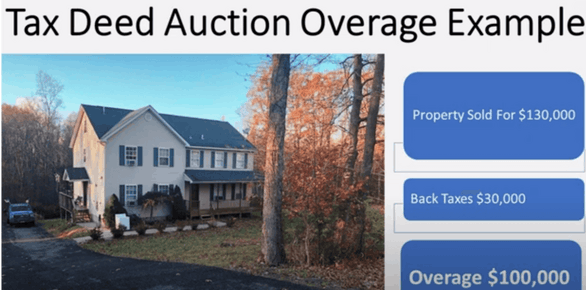All Categories
Featured
Table of Contents
Many of those homeowners really did not even know what overages were or that they were even owed any kind of excess funds at all. When a property owner is not able to pay property taxes on their home, they may lose their home in what is known as a tax sale public auction or a sheriff's sale.
At a tax sale public auction, properties are sold to the highest bidder, nonetheless, in some instances, a home might market for even more than what was owed to the county, which results in what are referred to as excess funds or tax obligation sale excess. Tax sale excess are the additional cash left over when a foreclosed residential or commercial property is marketed at a tax obligation sale auction for greater than the quantity of back tax obligations owed on the residential or commercial property.
If the property sells for greater than the opening proposal, then overages will certainly be created. Nevertheless, what the majority of homeowners do not understand is that several states do not enable areas to maintain this money on their own. Some state laws dictate that excess funds can only be claimed by a couple of events - consisting of the individual that owed taxes on the building at the time of the sale.
If the previous property proprietor owes $1,000.00 in back tax obligations, and the residential property sells for $100,000.00 at public auction, then the regulation states that the previous homeowner is owed the distinction of $99,000.00. The county does not reach maintain unclaimed tax obligation overages unless the funds are still not asserted after 5 years.
Strategic Real Estate Overages Approach Foreclosure Overages
However, the notification will typically be mailed to the address of the property that was sold, yet because the previous homeowner no much longer lives at that address, they often do not receive this notice unless their mail was being sent. If you remain in this circumstance, do not let the government keep cash that you are qualified to.

Every so often, I listen to talk regarding a "secret new opportunity" in business of (a.k.a, "excess profits," "overbids," "tax sale excess," and so on). If you're entirely unfamiliar with this principle, I wish to give you a fast introduction of what's going on here. When a homeowner stops paying their real estate tax, the local community (i.e., the area) will wait for a time before they seize the home in repossession and offer it at their yearly tax obligation sale public auction.
The info in this article can be affected by lots of unique variables. Suppose you have a residential or commercial property worth $100,000.
Favored Bob Diamond Tax Sale Overages Course Bob Diamond Tax Sale Overages

At the time of repossession, you owe about to the region. A couple of months later, the county brings this residential property to their yearly tax obligation sale. Here, they market your residential property (together with dozens of other overdue residential properties) to the highest bidderall to redeem their lost tax obligation income on each parcel.
This is since it's the minimum they will need to recoup the cash that you owed them. Right here's things: Your residential or commercial property is quickly worth $100,000. A lot of the financiers bidding on your residential property are completely mindful of this, too. In many cases, residential or commercial properties like your own will receive quotes much past the amount of back tax obligations in fact owed.
Get this: the region only needed $18,000 out of this residential or commercial property. The margin in between the $18,000 they required and the $40,000 they obtained is called "excess earnings" (i.e., "tax sales overage," "overbid," "surplus," etc). Numerous states have statutes that forbid the area from keeping the excess settlement for these properties.
The area has guidelines in location where these excess profits can be claimed by their rightful owner, usually for a designated period (which differs from state to state). And that specifically is the "rightful owner" of this cash? Most of the times, it's YOU. That's! If you shed your residential property to tax obligation repossession because you owed taxesand if that building ultimately cost the tax obligation sale public auction for over this amountyou could feasibly go and gather the difference.
Exceptional Tax Overages List Training Tax Overages Business Opportunities
This consists of proving you were the prior owner, completing some documents, and waiting on the funds to be supplied. For the ordinary person who paid full market value for their property, this technique does not make much feeling. If you have a significant quantity of money spent right into a residential property, there's method also much on the line to simply "let it go" on the off-chance that you can bleed some extra squander of it.
With the investing strategy I utilize, I might get buildings totally free and clear for dimes on the dollar. When you can get a residential or commercial property for an extremely affordable rate AND you know it's worth substantially more than you paid for it, it may extremely well make sense for you to "roll the dice" and attempt to accumulate the excess earnings that the tax repossession and public auction procedure generate.
Professional Tax Sale Overage List Education Overages Surplus Funds
While it can certainly turn out similar to the means I have actually explained it above, there are also a couple of downsides to the excess earnings approach you actually ought to understand. Real Estate Overages. While it depends significantly on the characteristics of the residential property, it is (and in many cases, most likely) that there will certainly be no excess earnings produced at the tax obligation sale public auction
Or maybe the area doesn't generate much public passion in their public auctions. Either way, if you're getting a residential property with the of letting it go to tax foreclosure so you can gather your excess proceeds, what if that money never ever comes through?
The very first time I pursued this technique in my home state, I was informed that I really did not have the choice of asserting the surplus funds that were created from the sale of my propertybecause my state didn't enable it (Tax Sale Overage List). In states like this, when they produce a tax obligation sale overage at an auction, They just maintain it! If you're considering using this strategy in your business, you'll wish to think long and difficult about where you're working and whether their regulations and laws will also allow you to do it
Specialist Tax Overages List Training Tax Overages
I did my best to provide the appropriate solution for each state above, but I would certainly recommend that you prior to waging the presumption that I'm 100% correct. Remember, I am not a lawyer or a CPA and I am not trying to give out specialist lawful or tax suggestions. Talk with your attorney or CPA before you act on this details.
Latest Posts
Investing In Tax Liens Risks
Best Books On Tax Lien Investing
Back Taxes Real Estate